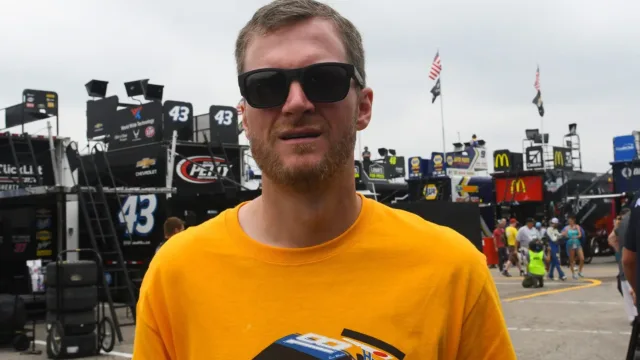Dale Earnhardt Jr. has shared new details about his emotional journey after losing his father, iconic NASCAR driver Dale Earnhardt Sr., describing the lasting impact of that heartbreaking day and how racing ultimately became his pathway to healing. Discussing the most difficult moments in the aftermath, Earnhardt Jr. reflected on how he found strength to move forward and reengage with the sport that connected him so closely with his late father, a key aspect of his identity and legacy.
The Tragedy That Marked a Turning Point
For Dale Earnhardt Jr., the events of February 18, 2001, at the Daytona 500 changed everything. His father, Dale Earnhardt Sr., was more than just a seven-time NASCAR Cup champion: He was widely known in the racing community as “The Intimidator” and inspired awe with his fearless approach in the black No. 3 car. On a personal level, he was his son’s ultimate hero, even though their relationship had challenges. Earnhardt Jr. admitted that he often acted out growing up, mostly in hopes of gaining attention from his father, but it was racing that drew them together. As the younger Earnhardt achieved victories in the Xfinity Series, the two began building the kind of bond both had wanted.
That connection, however, was abruptly shattered on the fateful final lap of the 2001 Daytona 500. While Michael Waltrip raced ahead for what would be his first career win, Dale Earnhardt Sr., running third, collided with the wall in what appeared at first to be a minor accident. The world soon learned the true depth of the tragedy, as NASCAR lost a legendary figure and Earnhardt Jr. mourned the loss of his father and hero.

“ON THIS DAY: In 2001, auto racing star Dale Earnhardt Sr. died in a crash at the Daytona 500. He was 49. https://t.co/3hFy737YGD pic.twitter.com/CAAdqFQnLw”
— ABC News (@ABC) February 18, 2024
Finding Strength to Move Forward
Looking back, Dale Earnhardt Jr. has reflected openly on the emotions and thoughts that helped him begin to heal after the loss. In a candid moment on the ‘Rubbin is Racing’ podcast, he addressed the inevitability of loss and the moment he realized that life would continue, whether or not he was ready:
“I knew this was all gonna happen. I didn’t know when I was going to lose my dad, but I knew it was gonna happen,”
he said on the ‘Rubbin is Racing’ podcast.
“I don’t get to choose whether you experience it or no. I learned that the day after my dad died, you get up the next morning…, The world is still going.”
— Dale Earnhardt Jr., NASCAR Driver and Broadcaster
He also acknowledged the pressure to keep moving, even through intense pain:
“And you can sit on the side lines as long as you want, but eventually, you’ve got to get back in the groove, and get back in the rotation, and make something happen, do something right,”
he admitted. This realization pushed him to return to racing only a few months later at Daytona for the 2001 Pepsi 400. Carrying the weight of public expectation and personal grief, Earnhardt Jr. accomplished something deeply meaningful—he led for much of the race and ultimately crossed the finish line first. That victory, celebrated by a roaring crowd, served as a tribute to his father and marked the first step in his process of healing.
Building a Legacy Through Racing
The significance of the 2001 Pepsi 400 win went beyond racing statistics or career milestones. It symbolized hope and renewal, not just for Dale Earnhardt Jr., but for everyone touched by the tragedy. In the years since, he continued to honor his father by excelling on the track, embracing opportunities in the broadcast booth, and becoming a respected voice and ambassador within NASCAR. The pain of that day has not vanished, but Earnhardt Jr. has discovered a sense of peace and purpose within the sport that shaped his family.
Moving forward for Dale Earnhardt Jr. has never meant erasing the memory of his father. Rather, his journey has become about honoring the past and carrying on the tradition, both through racing and through the bonds he’s built with fans, colleagues, and the broader racing world. His story—marked by resilience and authenticity—remains a powerful testament to how racing can provide both solace and a renewed sense of purpose after unimaginable loss.
